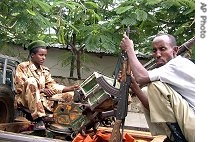2006年VOA标准英语-AU Approves Regional Peacekeeping Force for Som(在线收听)
By Cathy Majtenyi
Nairobi
13 September 2006
The African Union Wednesday endorsed a plan to send a regional peacekeeping force into volatile Somalia. The approval comes as the Union of Islamist Courts is reportedly advancing on a key southern port in Somalia.
----
The commissioner of the African Union's Peace and Security Council, Said Djinnit, explains to VOA the objective of the 8,000-strong force.
"The aim of the mission is to contribute to the on-going efforts in Somalia in terms of providing security assistance to the institutions of Somalia, providing assistance to institutional capacity building, and contributing to the promotion of dialogue and reconciliation in the country," he said.
Djinnit says the council also appealed to the United Nations Security Council to lift its long-running arms embargo against Somalia so that the mission could proceed.
Several heads of state and ministers belonging to the regional body Inter-Governmental Authority on Development, or IGAD, met in Kenya last week to reiterate their support for IGAD's peacekeeping force, known as IGASOM.
IGAD's peace plan, which the African Union authorized in January 2005, is meant to support the transitional government in its efforts to restore peace to the war-torn country. Uganda has volunteered personnel for the peace mission.
But some fear that the mission could undermine an agreement signed last week between the Union of Islamic Courts and Somalia's transitional government.
That agreement, to be finalized at the end of October, calls for the creation of a joint national army and police force, and has denounced what it terms "foreign interference" in Somalia. Some hard-liners have said the deployment of foreign peacekeepers would spoil last week's peace agreement.
The African Union's Djinnit says the Peace and Security Council took the objections of the Union of Islamic Courts into account during the deliberations.
"The Peace and Security Council cannot take a decision in isolation of the developments on the ground and the region," he said. "The position of deploying IGASOM has been taken some two years ago, and the issue is how to effect the decision taking into account the situation on the ground and the dynamics in the region."
Meanwhile, some media reports indicate that the Union of Islamic Courts is advancing on the southern port city of Kismayo. But court officials are quoted as saying the reports of an offensive are false propaganda.
Ever since civil war broke out in 1991, militias loyal to clan and sub-clan-based factions have controlled different parts of the country, with no central authority to provide law and order and even basic services to the population.
 Islamic militiamen in Mogadishu (file photo) |
||
Earlier this year, the Union of Islamic Courts seized control of the capital and other areas before reaching a truce with the government.